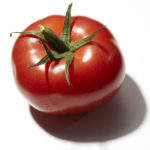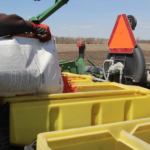
USDA to biotech: Call your own compliance
Steven Suppan, July 30, 2019 | The U.S. Department of Agriculture wants agribusiness to sell more genetically engineered (GE) seeds and food products all over the world, as soon as possible. This rule would go beyond already controversial genetically modified organisms (GMOs) to encompass hundreds of new products of new gene and genome editing techniques. The fastest way to do that?...Continue reading "USDA to biotech: Call your own compliance"
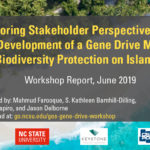
Workshop Report on Gene Drive Mice for Biodiversity Protection on Islands
S. Kathleen Barnhill-Dilling, June 24, 2019 | Mice offer an ideal genetic model for exploring the possibility of developing a synthetic gene drive in mammals. As pests, they pose challenges to human health, agricultural yields and storage, and biodiversity, especially on islands where they are not native. If research on gene drives in mice were to progress to a field trial, an island ecosystem would offer an additional level of physical containment. ...Continue reading "Workshop Report on Gene Drive Mice for Biodiversity Protection on Islands"
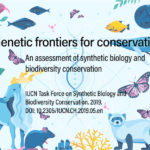
IUCN Report: Genetic frontiers for conservation – An assessment of synthetic biology and biodiversity conservation
Todd Kuiken, May 9, 2019 | Synthetic biology – altering or redesigning genes to meet human objectives – is a fast-developing field with significant potential impacts on nature conservation, according to the Genetic frontiers for conservation assessment report. So far mostly applied in agriculture and medicine, synthetic biology could have substantial knock-on effects on conservation – including modified genes spreading to non-target species and affecting broader ecosystems, but also benefits such as saving threatened species, reduced fertiliser use or diminished demand for products derived from threatened species....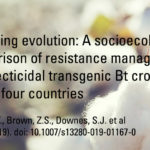
Governing evolution – A socioecological comparison of resistance management for Bt crops
Zachary Brown, March 21, 2019 | Cooperative management of pest susceptibility to transgenic Bacillus thuringiensis (Bt) crops is pursued worldwide in a variety of forms and to varying degrees of success depending on context. We examine this context using a comparative socioecological analysis of resistance management in Australia, Brazil, India, and the United States. We find that a shared understanding of resistance risks among government regulators, growers, and other actors is critical for effective governance. ...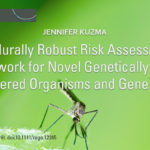
Procedurally Robust Risk Assessment Framework for Novel Genetically Engineered Organisms and Gene Drives
Jennifer Kuzma, March 8, 2019 | This article reviews the current state of gene-editing regulation for crops, illuminating the ways in which technology developers are repeating practices that may lead to the public and ethical failures of the first generation genetically engineered crops, and argues that the contentious socio-political history of genetic engineering will repeat itself for gene editing if these continue....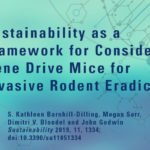
Sustainability as a Framework for Considering Gene Drive Mice for Invasive Rodent Eradication
March 4, 2019 | Sustainability as a Framework for Considering Gene Drive Mice for Invasive Rodent Eradication, by S. Kathleen Barnhill-Dilling, Megan Serr, Dimitri V. Blondel and John Godwin. Abstract: Gene drives represent a dynamic and controversial set of technologies with applications that range from mosquito control to the conservation of biological diversity on islands. Currently, gene drives are being developed in mice that may one day serve as an important tool for reducing invasive rodent pests, a key threat to island biodiversity and economies. ...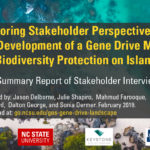
Report: Stakeholder Perspectives on Gene Drive Mice for Biodiversity Protection on Islands
Jason Delborne, February 20, 2019 | This article reviews the current state of gene-editing regulation for crops, illuminating the ways in which technology developers are repeating practices that may lead to the public and ethical failures of the first generation genetically engineered crops, and argues that the contentious socio-political history of genetic engineering will repeat itself for gene editing if these continue....
Can genetic engineering save disappearing forests?
Jason Delborne, January 18, 2019 | Forests in the US face many threats: climate change, invasive species, pests and pathogens. Could genetically engineering trees make these plants more resilient?" ...Continue reading "Can genetic engineering save disappearing forests?"

GES Colloquium | Jennifer Kuzma – Regulating Gene-Edited Crops
GES Colloquium, 2/5/18 - Jennifer Kuzma | Crop gene editing emerged just over a decade ago as a promising set of biotechnology techniques designed to more quickly and precisely introduce new or altered genes to change plant characteristics for better growth, product quality, processing, nutrition, or sustainability. Scientists in academia and the ag-biotech industry alike are promoting gene editing, through techniques such as CRISPR-Cas9, as the start of a second biotechnology revolution in agriculture. ...Continue reading "GES Colloquium | Jennifer Kuzma – Regulating Gene-Edited Crops"
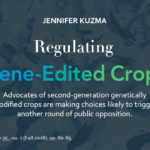
Issues: Regulating Gene-Edited Crops
This article reviews the current state of gene-editing regulation for crops, illuminating the ways in which technology developers are repeating practices that may lead to the public and ethical failures of the first generation genetically engineered crops, and argues that the contentious socio-political history of genetic engineering will repeat itself for gene editing if these continue....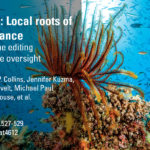
Editing nature: Local roots of global governance
Dr. Jennifer Kuzma, Goodnight-NC GSK Foundation Distinguished Professor and Co-director of the Genetic Engineering and Society Center, was one of the lead authors on an interdisciplinary team calling for global oversight of environmental gene editing in this Science Policy Forum, Editing Nature: Local roots of global governance....Continue reading "Editing nature: Local roots of global governance"

EU ruling on gene-edited plants and GMOs is more status quo than disruptive
Prior to the recent European Union ruling regarding gene-edited plants, opponents stoked fears that these new gene editing techniques were a loop-hole for big agricultural companies to release their untested, dangerous GMOs onto an unsuspecting...Continue reading "EU ruling on gene-edited plants and GMOs is more status quo than disruptive"

Kuzma Urges a Broader Conversation on Underlying Ethics of Gene Editing Technology
Source: Financial Express This Man Rewrites the Genetic Code of Animals By: Aki Ito | July 19, 2018 In this article about Dan Carlson, a scientist bioengineering hornless cattle, Jennifer Kuzma, co-director of the Genetic...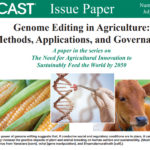
Genome Editing in Agriculture – CAST Issue Paper
PRESS RELEASE: July 9, 2018. Twentieth-century advances in plant and animal breeding did much to help meet the increasing food, fiber, feed, and fuel needs of an expanding world. But continued population growth, resource shortages, climate change, and pest prevalence make sustainability a daunting yet essential task. Genome editing is a powerful new method that enables unprecedented control over genetic material and offers the opportunity to make rapid advances that influence agricultural practices....Continue reading "Genome Editing in Agriculture – CAST Issue Paper"
